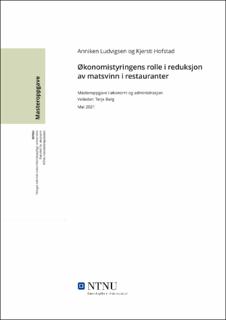| dc.contributor.advisor | Berg, Terje | |
| dc.contributor.author | Ludvigsen, Anniken | |
| dc.contributor.author | Hofstad, Kjersti | |
| dc.date.accessioned | 2021-09-22T16:07:26Z | |
| dc.date.available | 2021-09-22T16:07:26Z | |
| dc.date.issued | 2021 | |
| dc.identifier | no.ntnu:inspera:82753627:84559312 | |
| dc.identifier.uri | https://hdl.handle.net/11250/2780557 | |
| dc.description.abstract | En tredjedel av all mat som produseres i verden hvert år blir kastet (FN-Sambandet, 2021). FN har på bakgrunn av dette satt som mål å redusere matsvinn med 50 % innen 2030, hvilket bare kan løses gjennom samarbeid mellom alle ledd i verdikjeden. Dette krever at en bærekraftig tankegang implementeres i bedriftene, og her blir økonomistyringens rolle pekt på som helt sentral (Crutzen et al., 2017). Forholdet mellom en bedrifts økonomistyring og matsvinn er et tema som er lite forsket på i norsk kontekst, og som vi ønsker å finne ut mer om gjennom følgende problemstilling:
Hvorfor fokuserer restauranter i Trondheim på matsvinn, og hvordan benytter de sine økonomistyringssystemer for å understøtte dette?
For å besvare problemstillingen er det gjennomført en kvalitativ undersøkelse, med en abduktiv tilnærming til forholdet mellom teori og empiri. Det er intervjuet til sammen 12 daglige ledere og kjøkkensjefer ved 11 restauranter i Trondheim. Restaurantenes motivasjon for å fokusere på matsvinn er delt inn i rasjonelle begrunnelser, legitimering og normative begrunnelser, basert på innfallsvinklene til motivasjon for bærekraftig aktivitet som blant annet Hansen og Schaltegger (2016) presenterer. Hvordan restaurantene bruker sine økonomistyringssystemer er tolket i lys av rammeverket Levers of Control utviklet av Simons (1995b), samt profesjonsstyring, der kokkene sees på som en hybridprofesjon.
Resultatene tyder på at de fleste restaurantene har en kombinasjon av rasjonelt og normativt begrunnet motivasjon, og at legitimering ikke fremstår som en årsak til hvorfor restaurantene velger å ha fokus på matsvinn. Videre ser det ut til at restaurantene i hovedsak benytter diagnostiske styringssystemer, trossystemer og grensesystemer for å påvirke matsvinnet, der trossystemer benyttes mest uformelt gjennom den daglige driften, mens de to andre hovedsakelig brukes formelt. Også profesjonsstyring virker å være en påvirkende faktor med hensyn til matsvinn. | |
| dc.description.abstract | A third of all food produced in the world each year is discarded (FN-Sambandet, 2021). As a consequence of this, the UN has set a goal of reducing global food waste by 50 % by 2030, which can only be solved through cooperation between all links in the value chain. This requires implementation of a sustainable mindset in businesses. In this context, the role of management accounting is signaled out as essential (Crutzen et al., 2017). The relationship between a company’s management accounting and food waste is an area which has gained little attention in research in a Norwegian context. We seek to find out more about this topic using the following research question:
Why do restaurants in Trondheim focus on food waste, and how do they use their management control systems to support this?
In order to answer the research question, a qualitative study was conducted, with an abductive approach to the relationship between theory and data. 12 restaurant managers and head chefs at 11 restaurants in Trondheim were interviewed. The restaurants’ motivation for focusing on food waste is divided into a rational, a legitimation, and a normative approach, based on the perspectives for motivation for sustainable activities that Hansen og Schaltegger (2016) among others present. How the restaurants use their management control systems is interpreted through Simons’ (1995b) Levers of Control framework, and professional control, where the chefs are viewed as a hybrid profession.
The results indicate that most of the restaurants have a combination of a rational and a normative approach to food waste, and that legitimation does not seem to be a reason for restaurants to choose to focus on food waste. It also seems that the restaurants mainly use diagnostic control systems, beliefs systems, and boundary systems to reduce their food waste, where beliefs systems are used mostly informally through the day-to-day running of the restaurants, whilst the other two are mainly used more formally. Professional control also seems to be a factor that affects food waste in restaurants. | |
| dc.language | nob | |
| dc.publisher | NTNU | |
| dc.title | Økonomistyringens rolle i reduksjon av matsvinn i restauranter | |
| dc.type | Master thesis | |
